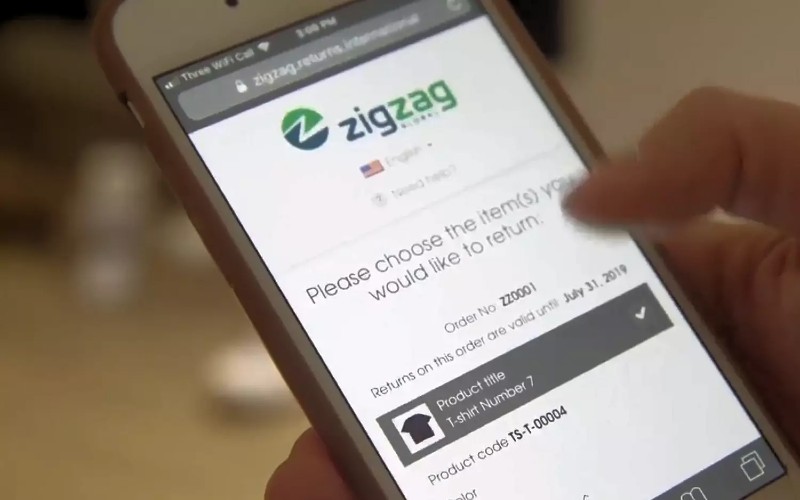If you shop online, the chances are that you have returned a product.
It is becoming something of a habit across the eCommerce industry, especially for Gen-Zers.
Al Gerrie founded ZigZag Global in 2015 after witnessing ever-increasing returns over two decades in the retail industry – and the problem has only worsened since that time.
“Fashion retailers can see anything between 20-50% return rates, depending on the product,” he tells BusinessCloud. “It is especially high for women’s wear.
“The UK is particularly strong in returns: about 76% of people check the returns policy before they decide to buy, while 41% of customers buy with the intention of returning a product – they might buy two or three sizes and know there’s going to be a return before they’ve even checked out.
“That number actually gets higher with younger buyers: 18-25-year-olds are more likely to return than any other demographic.”
White-labelled
ZigZag is a SaaS platform that helps retailers manage and resell returned stock in local markets through a returns portal that links directly from their website. The London-headquartered company featured in 12th spot on our RetailTech 50 ranking this year.
“The customer doesn’t realise they’ve left the retailer’s website – our platform is fully branded to match it – but we’re now managing that journey,” Gerrie explains during a demonstration.
“The customer enters their order number and their postcode, so we know who the retailer is, who the customer is and what was in the basket when they checked out. They choose a reason for the return from a number of options that the retailer pre-selects, then the choice of refund or exchange. If the customer is returning the item because it’s too small, then maybe we can sell them a larger one if the stock is available.
“We have a live stock feed of everything the retailer sells so we can decide whether to offer a refund or an exchange – and we’re able to help convert that sale. If they want a refund, we can help the consumer to shop again quickly by offering a gift card or refund to the account they hold with that retailer.
“We may incentivise them by offering a free return if they choose a gift card, or the option of a paid return if they don’t.”
Returns can be picked up, dropped off, taken to a participating shop or a locker. ZigZag, which works with around 1,000 carrier services in 130 countries, says its software also knows the most route-efficient warehouse to send the return to – meaning it can consolidate, resell or re-fulfil to another customer.
Win-win
In essence, the retailer saves money on returns, customers get faster refunds and stock re-enters the supply chain and is available for sale more quickly, while lowering the carbon footprint for the whole process.
A B2B solution has also been added, with more than 3,000 stores managing their own returns through the platform. “They could be returning a box or a pallet of stock: we help that retailer choose where to send the goods to – should it go back to the warehouse, to another store or back to the supplier?”

Gerrie says ZigZag, which has retail clients in around 30 countries, was always intended to be an international company. “We started by offering returns from six countries, expanded to 30 and now we’re in 130. We can actually serve over 200, but there’s only demand in 130.
“We process around 50 million returned orders a year – that’s about £1.5 billion worth of refunds.”
Crowdcube record
An early crowdfunding campaign was necessary prior to launch and would ultimately lead to a huge return for those investors.
“We went through a very slow phase of fundraising. It was difficult to get traction in the market because, at that time, we weren’t live and we didn’t have clients. So we crowdfunded the business then later took on angel investment through a family office followed by a VC round in 2018,” he explains.
Attracted by a client list including Topshop, Selfridges and GAP, strategic investment followed in 2019 from private equity house Circularity Capital and Silicon Valley investor Plug And Play Ventures.
“COVID then really accelerated the business because it drew more and more people online. We were ready for that growth – we were in the right place at the right time with a solution that was mature enough to handle lots of extra traffic.
“We were then talking to strategic investors [about a Series B round of funding] when one of those companies, Global Blue, offered to buy us. We weren’t looking for an exit, but it was the right thing at the right time for the other shareholders in the business. Even today, it is Crowdcube’s biggest return for its clients.
“I’m still very much involved in the business going forward and staying on as CEO.”
ZigZag employs 150 today and has further bases in France, Germany, Bulgaria and Portugal.
Parent company
Global Blue is the largest tax VAT reclaim business in the world. “It is building an ecosystem of post-purchase technology companies that can complement each other,” says Gerrie. “Digital receipts, tracking for orders, post-purchase notifications, communication with customers.
“And then smaller investments in resale marketplaces for goods and concierge delivery services. So there’s all sorts of complementary tech that we can plug into.”
At the suggestion that ZigZag must be a sticky solution, given that it offers clients a white-labelled platform which ties neatly into their existing site, Gerrie answers that it has a retention rate of 96-97% with customers renewing for three-year terms.
“We are now really happy with the kind of engagement we get with our retailers. I think they see us as an important part of what they do,” he says.
On the branding, he reveals: “We were going to be called Returns Direct at the beginning. But when we plotted out the journey of the parcel, it was a zig-zag: from the warehouse out to the customer, and then back again – but it may not go all the way back to the warehouse, it might go out to a new customer.”


